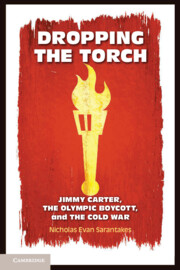Book contents
- Frontmatter
- Contents
- Acknowledgments
- Abbreviations
- Introduction Miracle on Ice
- Chapter 1 Lord Killanin and the Politics of the Olympics
- Chapter 2 Los Angeles versus Moscow
- Chapter 3 Jimmy Carter and U.S.-Soviet Relations
- Chapter 4 The Soviet Invasion of Afghanistan
- Chapter 5 The American Response
- Chapter 6 Easy Victories
- Chapter 7 Painful Losses
- Chapter 8 The White House Games
- Chapter 9 Coca-Cola, NBC, and the Defeat of the Iron Lady
- Chapter 10 The Vote in Colorado
- Chapter 11 Civil Wars
- Chapter 12 Carter versus Killanin
- Chapter 13 Moscow: The Olympics Are the Olympics
- Chapter 14 Los Angeles
- Chapter 15 Conclusion
- Epilogue
- Notes
- Bibliography
- Index
Introduction - Miracle on Ice
Published online by Cambridge University Press: 05 September 2012
- Frontmatter
- Contents
- Acknowledgments
- Abbreviations
- Introduction Miracle on Ice
- Chapter 1 Lord Killanin and the Politics of the Olympics
- Chapter 2 Los Angeles versus Moscow
- Chapter 3 Jimmy Carter and U.S.-Soviet Relations
- Chapter 4 The Soviet Invasion of Afghanistan
- Chapter 5 The American Response
- Chapter 6 Easy Victories
- Chapter 7 Painful Losses
- Chapter 8 The White House Games
- Chapter 9 Coca-Cola, NBC, and the Defeat of the Iron Lady
- Chapter 10 The Vote in Colorado
- Chapter 11 Civil Wars
- Chapter 12 Carter versus Killanin
- Chapter 13 Moscow: The Olympics Are the Olympics
- Chapter 14 Los Angeles
- Chapter 15 Conclusion
- Epilogue
- Notes
- Bibliography
- Index
Summary
Mike Eruzione as the team captain stood on the platform, hand over his heart, with his Olympic gold medal hanging from his neck, as a series of cables attached to the roof of the arena pulled the U.S. flag in the air ahead of those of Finland and the Soviet Union. He was singing words to the “Star Spangled Banner,” leading the crowd in the song, as the music played during the medal ceremony. It is difficult to overstate what he and his nineteen teammates on the U.S. Olympic Hockey Team had done to reach this moment. Just in athletic terms, their victory was astonishing. They had defeated a Soviet team that had won the gold medal of the last four Olympiads. During that run, the goal differential between the Soviets and their opponents had been 175–44. After 1980, the Soviets would not lose to another U.S. team for another eleven years. In fact, they would not lose any game in international play for another five years.
As impressive as the hockey team’s success was in athletic terms – and it was extraordinary – their gold medal was far more significant to the psyche of the nation. “It was what America needed in troubled times,” an official of the U.S. Amateur Hockey Association explained a few weeks later. Their win produced “a release of emotion and national pride that swept a country searching for something to bolster its pride.”
- Type
- Chapter
- Information
- Dropping the TorchJimmy Carter, the Olympic Boycott, and the Cold War, pp. 1 - 14Publisher: Cambridge University PressPrint publication year: 2010

